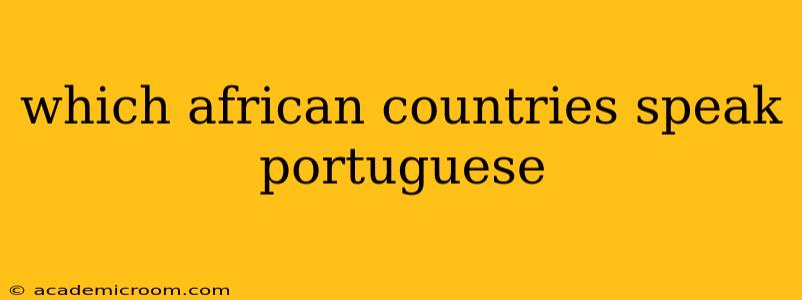Which African Countries Speak Portuguese?
Portuguese is a major language in Africa, spoken by millions across several countries. Understanding which nations use Portuguese is crucial for anyone interested in African culture, history, or business. This guide delves into the African nations where Portuguese holds official language status, exploring its history and influence.
What is the history of Portuguese in Africa?
The presence of Portuguese in Africa is deeply rooted in its colonial history. Beginning in the 15th century, Portugal established a significant colonial presence along the African coast, extending its influence inland over centuries. This resulted in the widespread adoption of Portuguese in various regions, impacting the language, culture, and identity of these nations. Even after independence, Portuguese remained an official language in many former Portuguese colonies, shaping their political, economic, and social landscapes.
Which African countries have Portuguese as an official language?
Five sovereign African nations recognize Portuguese as an official language:
- Angola: Portuguese is the official language of Angola, a country with a rich history intertwined with Portuguese colonization. It’s the primary language of administration, education, and commerce.
- Mozambique: Similar to Angola, Mozambique utilizes Portuguese as its official language, a legacy of its colonial past. The language plays a vital role in national unity and serves as a bridge between diverse linguistic groups.
- Guinea-Bissau: In Guinea-Bissau, Portuguese serves as the official language, reflecting its history as a Portuguese colony. Despite the presence of other local languages, Portuguese maintains its dominance in formal settings.
- São Tomé and Príncipe: This island nation in the Gulf of Guinea also counts Portuguese as its official language, a testament to its history as a Portuguese colony.
- Cape Verde: Located off the coast of West Africa, Cape Verde uses Portuguese as its official language, a lasting influence from its colonial past. The Creole languages spoken on the islands also show significant Portuguese influence.
What other languages are spoken in these Portuguese-speaking African countries?
While Portuguese serves as the official language in these nations, it's important to note that a multitude of other languages are spoken within their borders. These indigenous languages represent the rich linguistic diversity of Africa. For example, Angola has hundreds of Bantu languages; Mozambique boasts a variety of Bantu and Nguni languages; Guinea-Bissau has a multitude of languages from various language families. These local languages are critical parts of the culture and identity of their respective communities.
How many people in Africa speak Portuguese?
Precise figures are challenging to obtain due to the complexities of language use and data collection in these diverse nations. However, millions of people across these five countries are fluent in Portuguese, making it a significant language in Africa. Its usage varies considerably depending on region, socioeconomic status, and educational background.
Is Portuguese becoming less prevalent in these African countries?
The continued use of Portuguese in these African nations is a complex issue. While efforts to promote local languages exist, Portuguese's role in education, government, and business ensures its continued prominence. The language serves as a crucial tool for national unity, facilitating communication across regions and ethnic groups.
What are the challenges of maintaining Portuguese as an official language?
Despite its importance, maintaining Portuguese faces challenges. These include promoting fluency amongst younger generations, addressing linguistic disparities between urban and rural areas, and providing sufficient resources for Portuguese language education. Ongoing investment in language education and cultural preservation is essential to ensure the continued prominence of Portuguese in these African nations.
